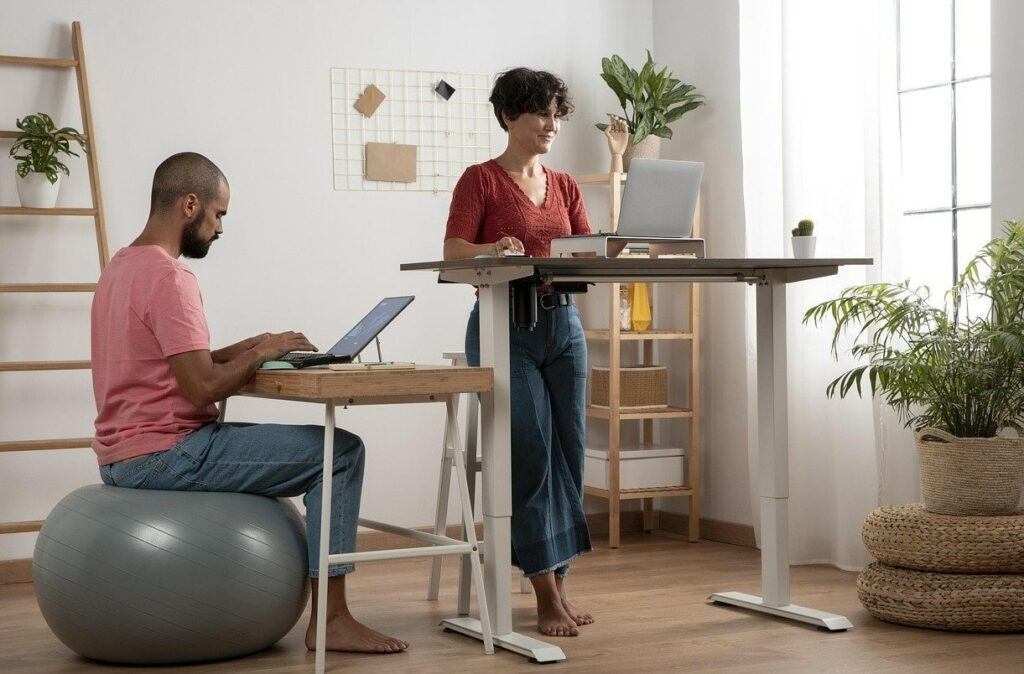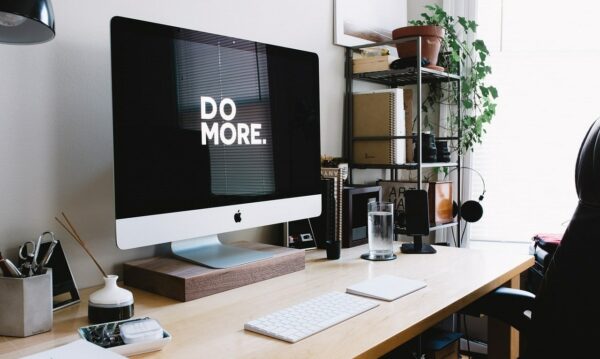Because I work from home full-time, my home office can’t be just a makeshift spot at the dining table. It’s where I spend hours every day, so I need it to be both comfortable and conducive to my workflow. A critical aspect of this is my desk.
A suitable desk isn’t a luxury, it’s a necessity. Not only does my desk impact my productivity, but it also affects my health and well-being.
If you too are planning to work from home choosing the right desk for your home office is essential. Your desk needs to align with your daily tasks, reflect your personal style, and fit neatly into the dimensions of your workspace.
As you make the move from a traditional office to a home-based one, here's what to consider in selecting this pivotal piece of furniture. • Your home office needs • Different desk types and the benefits of each • How quality, budget, sustainability, and style factor into selecting the perfect desk
Evaluating Your Home Office Needs
I can’t overemphasize how essential it is to first assess the size and layout of your home workspace before making a desk purchase. When you measure the area, you’re ensuring that the desk won’t cramp your style – literally. You need enough room for other essentials and, of course, some personal space.
Once you’ve got the spatial dimensions down, think about the type of work you’ll be doing at this desk. Are you drafting designs? A larger surface might be in order. Buried in paperwork? Look for something with plenty of drawers. If your job is more digital, maybe you won’t need as much space, but you’ll definitely want a desk that can manage cables and keep things tidy.
Ergonomics should not be an afterthought – it’s about your well-being. You’ll likely spend hours at your desk, so choose one that supports a natural posture. That means a desk at the right height, ample legroom, and compatibility with ergonomic chairs or accessories.
Ergonomics The term ergonomics is derived from the Greek words "ergon" (meaning work) and "nomos" (meaning laws). As explained by the International Ergonomics Association (IEA), ergonomics is the science of designing systems to "optimize human well-being and overall system performance." Ergonomics addresses physical, cognitive, and organizational aspects of the work environment. As it pertains to the physical environment, "ergonomics is concerned with human anatomical, anthropometric, physiological and biomechanical characteristics as they relate to physical activity," writes the IEA. The National Institute for Occupational Safety and Health (NIOSH) elaborates on the goals of ergonomics: "The goal of ergonomics (i.e. the scientific study of people at work) is to prevent soft tissue injuries and musculoskeletal disorders (MSDs) caused by sudden or sustained exposure to force, vibration, repetitive motion, and awkward posture."
Finally, clutter can be a major roadblock to productivity. When choosing the right desk for your home office, don’t forget about storage and organization. Desks with built-in shelves or filing systems are a big help, especially if you’re short on space.
The Desk Matters: Types and Their Benefits
When you’re hunting for the perfect home office desk, you might be overwhelmed initially by the many options available. Each type of desk comes with its unique benefits, catering to different needs and work styles.

Let’s look at some basic desk types and consider the benefits of each.
Standing desks. Standing desks have gained popularity, and for good reason. By enabling you to switch between sitting and standing, they promote a dynamic work environment, which can potentially lead to better health and increased productivity. If you’re someone who’s health-conscious and likes to stay active, a standing desk might be a smart choice.
Classic desks. On the other hand, if you prefer a more traditional setup, classic desks never go out of style. They bring an air of sophistication to any room and come packed with modern features. Cable management, built-in chargers, and discrete compartments can make these traditional pieces a fit for the contemporary worker.
Corner desks. For those dealing with spatial constraints, a corner desk might be ideal. As the name suggests, corner desks are designed to nestle neatly into your room’s corner, optimizing what might otherwise be unused space. The bonus is the expansive desktop area they offer, which can be a major advantage when your work involves multiple monitors or extensive paperwork.
Adjustable and convertible desks. Then there are adjustable and convertible desks. These versatile workstations offer the ultimate in flexibility. Need to lower your desk to turn your space into a craft table for your kids? Or perhaps elevate it for a standing meeting? Adjustable desks go the distance, adapting to many aspects of both your work and personal life.
Now you understand your basic desk options. But how do you navigate through these options and finalize your choice?
Making The Decision: Tips on Selecting The Perfect Desk
Finalizing a choice is often the toughest part of making a decision. But by considering factors such as quality, budget, sustainability, and style you’ll be able to make an informed decision and find a desk you love.
Let me share some expert tips on how to select the desk that best suits your home office.
Quality. In the words of the old Ford tagline, “Quality is job one.” Do not shortchange yourself when it comes to the quality of your home office desk. It needs to be sturdy, comfortable, and sufficiently spacious. If your desk is impeding your productivity, failing to meet your storage and organization needs, or wobbling and threatening to fall apart then its not of sufficient quality. Period.
TIP: If you have the opportunity to try before you buy, do so. Sit at your prospective desk. Is it comfortable? Imagine working at it. Does it lend itself to your work and the tools of your profession? Give it a good shake. Is it sturdy?
If you are buying online and can’t examine your desk in person make sure to read user comments, reviews, and expert opinions. These insights can provide real-world context and potentially unveil aspects of a desk you hadn’t considered. Also, before you “check out” be certain you understand the merchant’s return policy.
Budget. One the one hand, seeing your desk as an investment is important. You wouldn’t want to replace your desk every few years, so allocating a reasonable portion of your budget towards a quality desk can save you money in the long run.
Quality does not necessarily mean expensive, however. As I shared with you in “How To Create A Productive Workspace At Home,” my home office desk is formed by two inexpensive ($72 each at the time I bought them) 47″ by 24″ Zinus desks I bought from Walmart and placed together to form an ample L-shaped work surface. They are a comfortable height, they are sturdy, and they provide plenty of work space. They even match the other decor in the room.
TIP: Your perfect desk does not have to be a conventional desk. A table may provide a superior work surface for less.
Sustainability. Sustainability is important, but also relative. If you have the money to spend on sustainably-sourced office furniture by all means spend it – it exists. If you wish to purchase a cocobolo (like Saul Goodman) or a similarly well-crafted natural wood desk that can be refinished and passed down through generations as a family heirloom, by all means do so.
Quality materials can last longer and can withstand the daily grind while still looking great, but don’t spend money on furniture – any furniture – disproportionate to its expected lifespan. If you are beginning your working from home venture on a budget, your goal should be to choose a desk that you will be happy with for the foreseeable future and that won’t wind up in the landfill inside of ten years, better still twenty.
TIP: You can ballpark how long a piece of furniture is likely to last from the manufacturer's warranty.
Style. Functionality doesn’t have to be at odds with style. You can have both, and it’s beneficial to prioritize a desk that meets your work requirements while also fitting into the aesthetic of your home. It’s about creating a space where you enjoy spending time, which is pivotal when you’re working from home.
TIP: With the many desks and desk-like options available one or more will suit your style. Just don't forget this isn't the office, this is your home office ... part of your home. Choose a desk with aesthetics you can live with.
Final Thoughts
Equipped with this advice, I’m confident you’re ready to choose a desk that will not only complement your work style but also enhance your home office environment. Go find that desk that you’ll be glad to sit at every day, and watch how it positively influences your productivity and mindset.
If you still have questions about choosing the right desk for your home office or want to share your own tips (or stories) PLEASE DO SO in the comments below.

